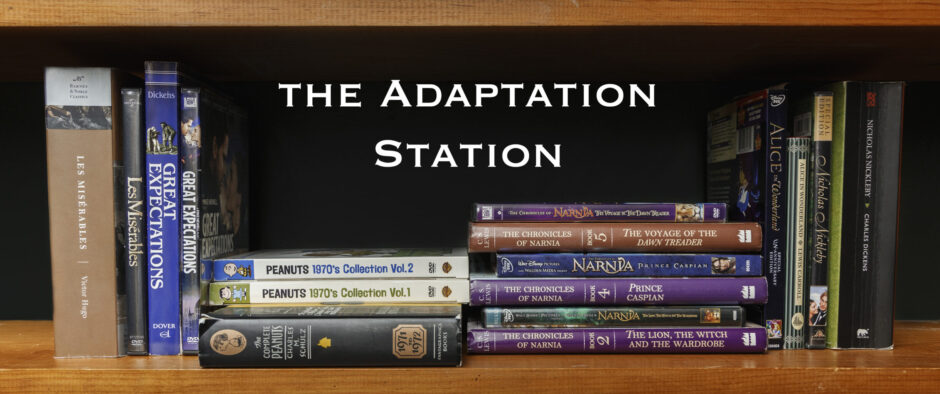It is a truth universally acknowledged that the Jane Austen fandom is one of the hardest groups to please as fans of the 2005 movie adaptation of Pride and Prejudice will attest in exasperation. Critics enthusiastically praised the film’s beautiful cinematography, its use of visual symbolism, its cast, particularly Keira Knightley in the lead role of Elizabeth Bennet, and generally found it to be a delightful and highly emotional viewing experience. It also was nominated for multiple awards and director Joe Wright won a BAFTA for best new filmmaker. But many fans of the book and Jane Austen in general, though certainly not all of them, bitterly condemn the movie for dumbing down its source material’s satire with sentiment, altering characters and being historically inaccurate.[1]I’m not going to get into the historical accuracy issue since it requires more research than I feel like doing.
I can’t say I agree with the more extreme fan criticisms of the adaptation. It’s hardly the utter abomination some would call it. The script by Deborah Moggach sticks close to the book’s broad storyline though not always to its spirit and includes many of its most hilarious lines of dialogue (“Well, if Jane does die, it will be a comfort to know it was in pursuit of Mr. Bingley”) though not as many it could have. Brenda Blethyn as the flighty Mrs. Bennet, Donald Sutherland as the dryly sarcastic Mr. Bennet, Kelly Reilly as the preening Miss Bingley and Tom Hollander as the sycophantic Mr. Collins with his air of perpetually reading off cue cards are all fun. The movie does a decent job of capturing its source material’s humor. I love the way Wright shoots the dance/argument between Elizabeth and Mr. Darcy (Matthew Macfadyen) like it’s a boxing match and the ensuing montage of the Netherfield Ball that keeps track of all the characters’ storylines in one long continuous shot. The soundtrack is nice if you like piano music. Overall, the movie is a very pleasant viewing experience if you like this kind of film and if you don’t, then it’s honest enough about what it is that you know not to watch it.
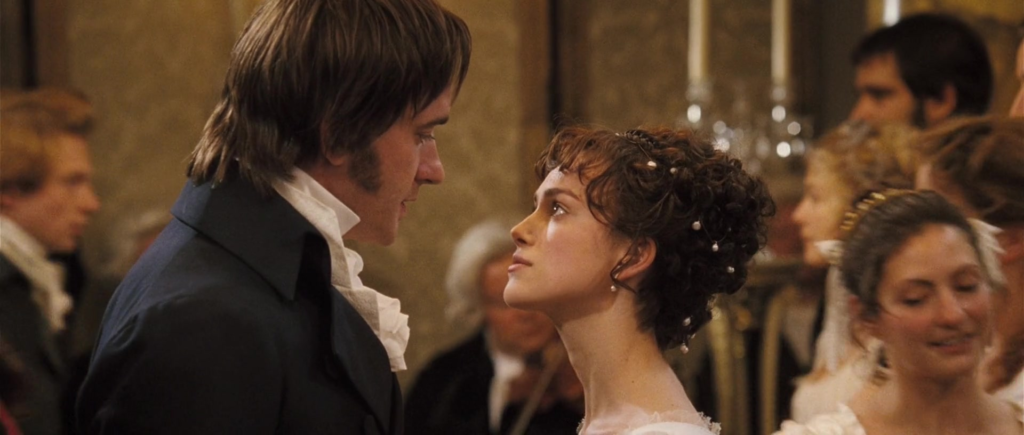
However, I have to say I lean negative on the movie. My reasons for doing so are a tad different from what you might expect. Unlike many of the adaptation’s detractors, I watched it before reading the book, having seen Douglas McGrath’s Emma and wondered if Jane Austen movies were a great thing that I’d missed out on all my life. After watching it, I decided not. That’s not to say I hated the movie or anything, but I couldn’t understand from it why Pride and Prejudice was considered a great story. Only when I read the book in its entirety years later did I get it.[2]Though I still honestly prefer Emma.
Many fans of the book who dislike the 2005 movie cite the 1995 BBC miniseries written by Andrew Davies and directed by Simon Langton as the better, more faithful adaptation. Fans who prefer the 2005 adaptation tend to describe that one as stuffy and dull by comparison. (Ironically, the 1995 series was originally seen as an unusually modern, sexy, audience friendly version of Pride and Prejudice.) I want this post to be about book vs movie, not miniseries vs movie but I can’t resist bringing up an early scene original to the 1995 adaptation, one that in my opinion actually improved on the book by getting us invested in the characters of Elizabeth and her older sister, Jane, right away.
Elizabeth: If I could love a man who would love me enough to take me for fifty pounds a year, I should be very well pleased. But such a man could hardly be sensible, and you know I could never love a man who was out of his wits.
Jane: Oh, Lizzie! A marriage where either partner cannot love nor respect the other, that cannot be agreeable to either party.
Elizabeth (re: their parents): As we have daily proof. But beggars, you know, cannot be choosers.
Jane: We are not very poor, Lizzie.
Elizabeth: With father’s estate entailed away from the female line, we have little but our charms to recommend us. One of us at least will have to marry very well and since you are quite five times as pretty as the rest of us and have the sweetest disposition, I fear the task will fall on you to raise our family fortunes.
Jane: But, Lizzie, I would wish…I should so much like…to marry for love.
Elizabeth: And so you shall, I’m sure. Only take care you fall in love with a man of good fortune.
Jane: Well, I shall try to please you. And you?
Elizabeth: I am determined that nothing but the very deepest love will induce me to matrimony so I shall end an old maid and teach your ten children to embroider cushions and play their instruments very ill.
Compare this with the first conversation between Elizabeth and Jane (Rosamund Pike) we get in the 2005 movie.
Elizabeth: If every man in the room does not end the evening in love with you, I am no judge of beauty.
Jane: Or men.
Elizabeth: No, no, they are far too easy to judge.
Jane: They’re not all bad.
Elizabeth: Humorless poppycocks in my limited experience.
Jane: One of these days, Lizzie, someone will catch your eye and then you’ll have to watch your tongue.
That’s basically good writing. Even fun writing. But it focuses on only the most generic of romcom tropes from Pride and Prejudice and this is indicative of what’s to come.
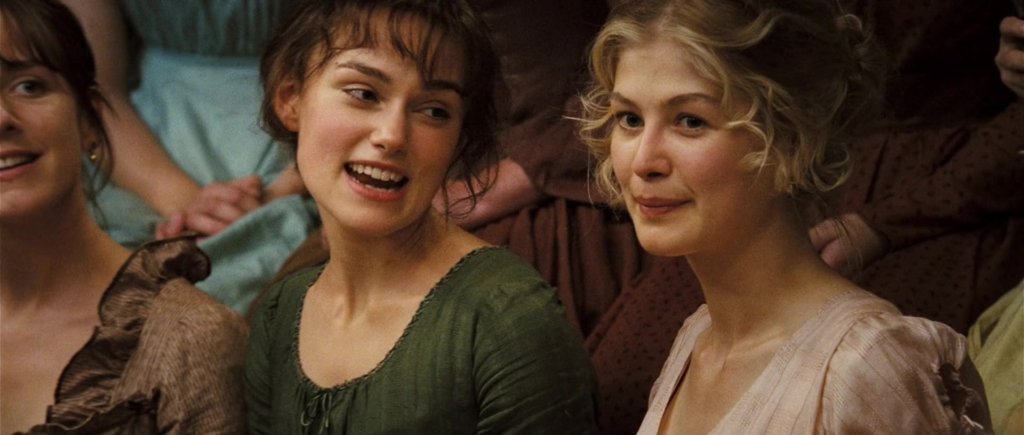
Having said that, I don’t think everything about the 1995 miniseries is superior to the 2005 movie. I think I like Keira Knightley’s performance as Elizabeth better than Jennifer Ehle’s. While Ehle is a fine actress, her sweet little smile throughout the 1995 Pride and Prejudice makes it hard for me to buy her as the cynical, sarcastic Elizabeth Bennet. Even in some moments, though not all of them, when her character is really angry or upset, she maintains that same smile. (I almost wish she were playing Jane instead.) Knightley smiles plenty in the role too but her smile conveys more mischief. Actually, the 2005 adaptation’s characterization of Elizabeth goes too far in the opposite direction of the 1995’s one, making her far too emotional and fiery. She’s considerably angrier and more flustered at Mr. Collins’s tactless proposal to her here than she is in the book and seems genuinely scared that her father will make her marry him. She’s also more visibly bitter towards her various family members for their bad behavior. While the dialogue in her climactic confrontation with Darcy’s domineering aunt, Lady Catherine de Bourgh (Judi Dench) stays reasonably close to that in the book, Elizabeth seems as if she’s about to burst with emotion throughout it and afterwards runs to her room crying and yelling over her shoulder for everyone to leave her alone. All this was doubtless to make her a more modern heroine, but it ignores the fact that a big part of what has won the literary Elizabeth Bennet the admiration of so many readers, historical and modern, is her cool emotional control. Without it, she seems like a much more generic heroine.[3]To be fair, the 1995 miniseries also had Elizabeth lose her temper more than she does in the book in the scene of Mr. Collins’s clumsy attempt to comfort the Bennets in their distress, even … Continue reading
While Elizabeth may lash out at her family in the movie more than in the book, the adaptation counterintuitively wants them to be more sympathetic than they are there. I can live with Mrs. Bennet being more loveable than Austen meant for her to be[4]The movie does retain her being ridiculously happy about her youngest daughter’s eventual marriage instead of seeing it as a sadly necessary evil as everyone else does but her final scene in … Continue reading but the film could really stand to do more to establish the youngest and most boy crazy Bennets, Kitty (Carey Mulligan) and Lydia (Jena Malone), as negative characters. For the first half, they come across as giggly and silly but not particularly selfish or callous or even particularly annoying. In a scene of Jane receiving some painful news, they’re uncharacteristically quiet as if out of respect for her. Because of this, Lydia feels like she’s arbitrarily turned into a different character in the second half.
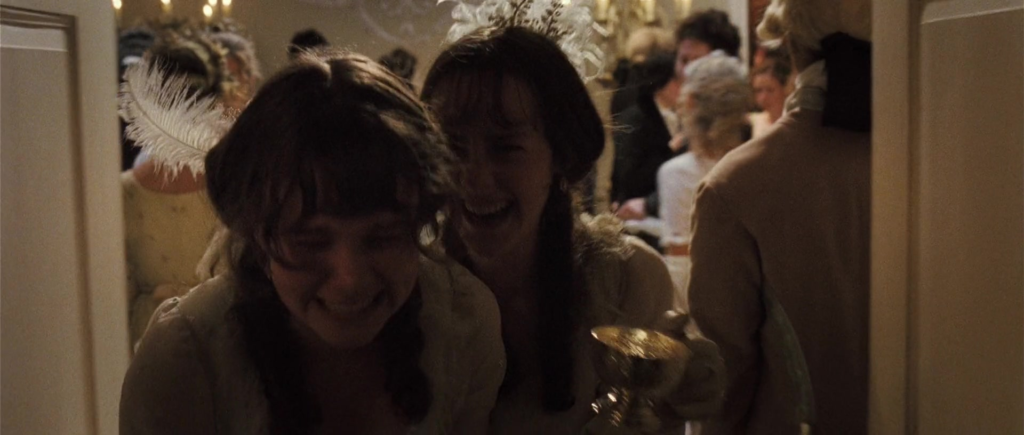
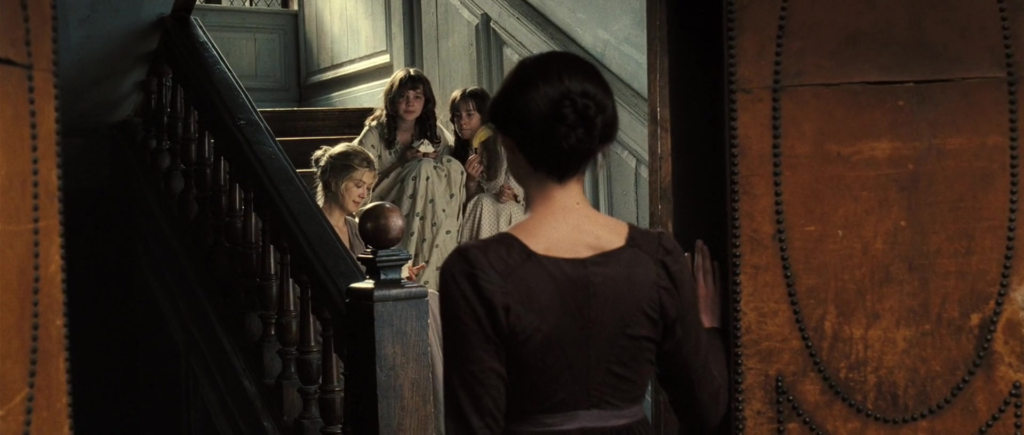
Then there’s Mary Bennet (Talulah Riley) who comes across somewhat pretentious but not nearly as arrogant and unlikeable as she does in the book.[5]She’s also far too pretty to be the plain sister even though that still seems like how she’s supposed to appear. Or am I just the only one who finds straight hair attractive? She still speaks smugly of one of her sisters being ruined but only briefly and without coming close to her literary counterpart’s insensitivity. She still sings terribly at the Netherfield ball but afterwards she runs away crying and humiliated, making her much more self-aware than in the book. This combined with her discomfort in social situations does a great job of making Mary sympathetic, but I don’t see how her being sympathetic benefits the story. If anything, it hurts it as it’s unclear why Jane and Elizabeth aren’t nicer to her, and she doesn’t get any kind of ending.[6]The modern Pride and Prejudice update, The Lizzie Bennet Diaries, also would have Lydia and Mary be more sympathetic than in the book but it would do so more deliberately and alter their … Continue reading For all its problems, the Bennet family in the movie doesn’t come across as dysfunctional as in the book so there doesn’t seem to be a pressing need for Elizabeth or Jane to get married and escape from them except for the financial motive which Jane says isn’t important to her anyway.
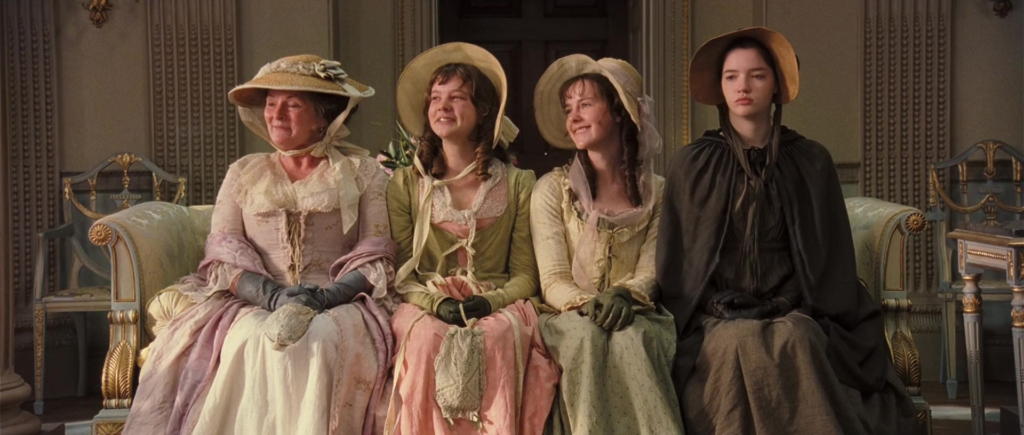
One character I think Deborah Moggach writes better than Andrew Davies is the romantic false lead, Mr. Wickham (Rupert Friend.) The initial banter between him and Elizabeth does a great job of making him seem like a better match for her playful character than the dour Mr. Darcy. Working against this however is Friend’s performance which is strangely stiff and unappealing.[7]Speaking of unappealing, I’m not a fan of this adaptation’s decision to portray Mr. Bingley (Simon Woods) as such a comic bungler. It makes it hard to root for him to end up with the … Continue reading His tone when he describes Darcy as unfairly persecuting him is so transparently petty that it’s easy to guess his account isn’t to be trusted. I suspect this was because the movie was so enamored of the romance between Darcy and Elizabeth that it didn’t want viewers to consider that someone else might be better for her even for a moment.
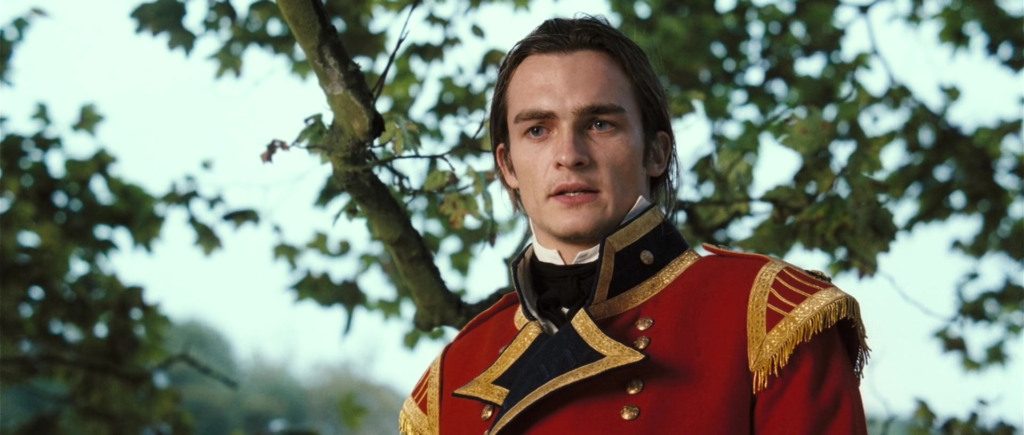
This Pride and Prejudice really bets everything on the central love story, downplaying the book’s character development and moral messages as much as possible to focus solely on it and for the film’s fans, this is a big part of its appeal. I’m not such an Austen Nazi that I can’t stand things like Darcy’s first proposal taking place during a torrential downpour matching the characters’ stormy emotions and his second, more successful one taking place in a misty meadow at sunrise. It’s definitely more swoony than Jane Austen’s realism would have allowed but I’d be happy to enjoy it on its own terms if I were really enjoying the love story.[8]And for what it’s worth, I don’t think it’s against the spirit of the book to portray Elizabeth as loving the beauties of nature. Austen had her be excited to tour the countryside … Continue reading But that’s the thing. I don’t particularly enjoy the movie’s central love story. That’s because when you take away all the character development and moral messages from the book, it isn’t very interesting.
Well, that description’s not totally fair. The movie certainly doesn’t take away all the character development for the leads from the source material. It stays too true to the plot for that. Elizabeth is still shocked to hear Darcy’s side of Wickham’s story and realize she likely misjudged both men. But she comes across as more disappointed in Wickham than guilty about her own actions. You could also interpret her as being genuinely attracted to Darcy and mortified that one of her main reasons for turning down his proposal was invalid. Here’s what she thinks in the book at this point.
“How despicably have I acted!” she cried.—”I, who have prided myself on my discernment!—I, who have valued myself on my abilities! who have often disdained the generous candour of my sister, and gratified my vanity, in useless or blameable distrust.—How humiliating is this discovery!—Yet, how just a humiliation!—Had I been in love, I could not have been more wretchedly blind. But vanity, not love, has been my folly.—Pleased with the preference of one, and offended by the neglect of the other, on the very beginning of our acquaintance, I have courted prepossession and ignorance, and driven reason away, where either were concerned. Till this moment, I never knew myself.”
She never says anything in the movie that indicates remorse so powerfully. A few scenes later she rants to her aunt and uncle, the Gardiners (Penelope Wilton and Peter Wight), against men, saying that they’re all “either eaten up with arrogance or stupidity.” Her aunt warns her that her speech “savors strongly of bitterness.” This comes from the book, but the movie has less time than the book to develop the characters. Showing Elizabeth’s disdain for her own behavior at this point is more important than showing her be disgusted with Darcy. In fact, this is where she should be starting-just starting, mind you-to respect him.
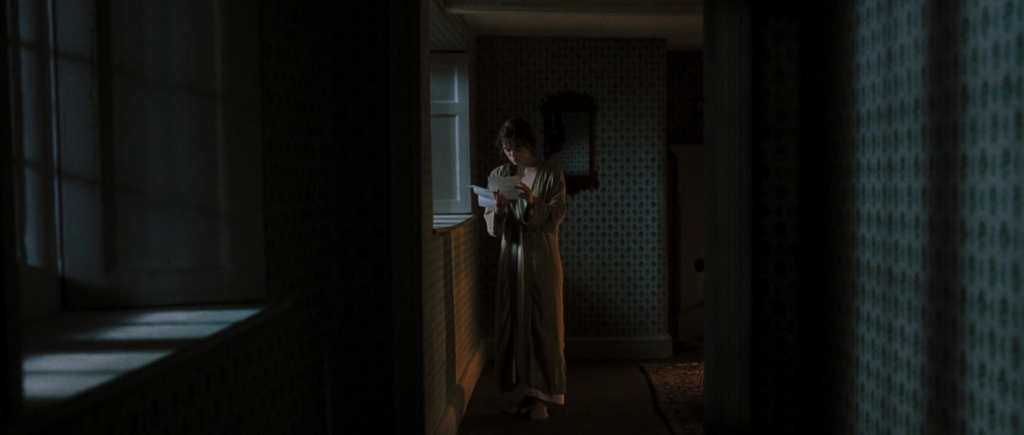
There’s also not anything that indicates Darcy’s repentance as powerfully as this quote from the book.
“I have been a selfish being all my life, in practice, though not in principle. As a child I was taught what was right, but I was not taught to correct my temper. I was given good principles but left to follow them in pride and conceit. Unfortunately an only son (for many years an only child), I was spoiled by my parents, who, though good themselves, (my father particularly, all that was benevolent and amiable,) allowed, encouraged, almost taught me to be selfish and overbearing, to care for none beyond my own family circle, to think meanly of all the rest of the world, to wish at least to think meanly of their sense and worth compared with my own. Such I was, from eight to eight-and-twenty; and such I might still have been but for you, dearest, loveliest Elizabeth! What do I not owe you! You taught me a lesson, hard indeed at first, but most advantageous. By you, I was properly humbled. I came to you without a doubt of my reception. You showed me how insufficient were all my pretensions to please a woman worthy of being pleased.”
While the movie retains his unexpected friendliness to Elizabeth’s aunt and uncle, there’s no indication that they challenged his expectations of people “in trade.” It feels more like he was always a nice person who was misunderstood rather than generally admirable but snobby and full of himself and needing reformation. There are two drafts of the script available to read online and both of them include a moment where Darcy tells Elizabeth he’s been thinking about how he appears and acts to others. This wasn’t nearly as powerful as what Jane Austen had him write but it would have been a step in the right direction and it’s frustrating it was cut.[9]Speaking of those drafts, neither of them contains my favorite line in the movie that’s not from the book. When an embarrassed Elizabeth limply says she doesn’t want to see Mr. … Continue reading
Of course, there always was an extent to which Darcy was misunderstood in the book. There one of the main things that made Elizabeth think better of him was hearing how well regarded he was by his servants and tenants. Recall his housekeeper (Meg Wynn Owen in the movie) praising him while giving a tour of Pemberley. This was originally in the script but is inaudible in the final movie. Because of that, it honestly comes across as if Elizabeth is just reassessing his character because he has a cool house. Between then and his second proposal there’s only one scene of Darcy and Elizabeth enjoying each other’s company, the one when she meets his sister, Georgiana (Tamzin Merchant.) It’s well written but it’s one of the least interestingly shot scenes in the movie, having none of the flair of the earlier scenes of tension between the reluctant lovers. In the book, Elizabeth was insulted by Darcy telling her he liked her “against his reason.” Their love story was about the two of them learning it was reasonable for them to love each other. But the movie seems to find the idea of being loved against someone’s better judgement perfectly romantic. That might be the main thematic difference between it and the book.[10]In the movie’s defense, the part of the story that takes place at Pemberley is a pain for adapters since it’s where Darcy and Elizabeth really bond with each other, but Austen … Continue reading The result is a very generic “they hate each other and then suddenly they don’t” love story. The filmmakers were so enamored of the idea of Pride and Prejudice being the template for every well-known romantic comedy that came afterwards that they forgot to include anything that made it unique.[11]Besides which they forgot that Much Ado About Nothing was the real original romcom!
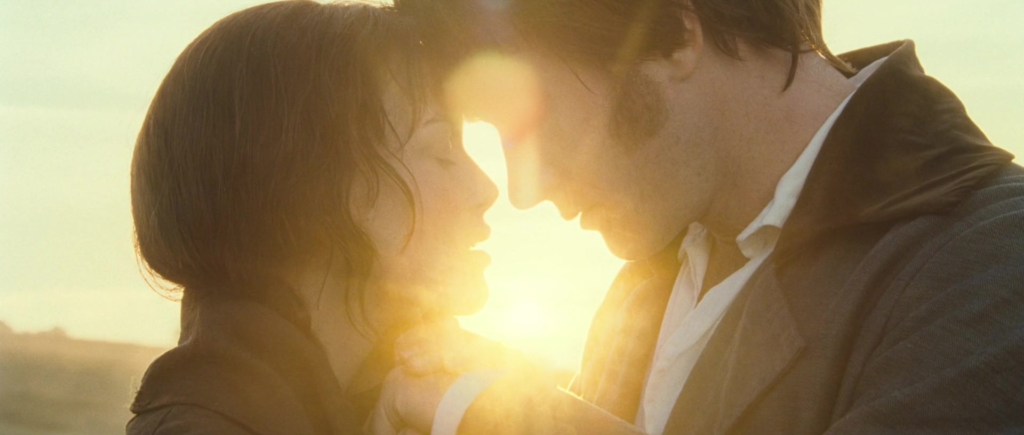
OK, I began this post with the intention of forging a middle ground between the lovers and the haters of this movie, but now I see that most of it has been devoted to criticizing it. That’s because most of the things I like about it can be summarized in sentences while the things I find underwhelming or distracting about it require a lot of explanation. But there are a lot of people who love this movie and despite what my summary of its detractors’ criticisms might lead you to believe, many of them are people who also love the book. For all of what I wrote about how it bungles the character development of the leads and the theme of admitting one’s wrongs, it does end with Elizabeth telling her father, “I’ve been nonsensical. He’s been a fool, about Jane, about so many other things, but then so have I. You see, he and I are both so similar. We’re both so stubborn.” I just find that much less interesting and morally conscious than what Jane Austen wrote. Still, this is a decent adaptation of Pride and Prejudice even if it can never compete with the best one.
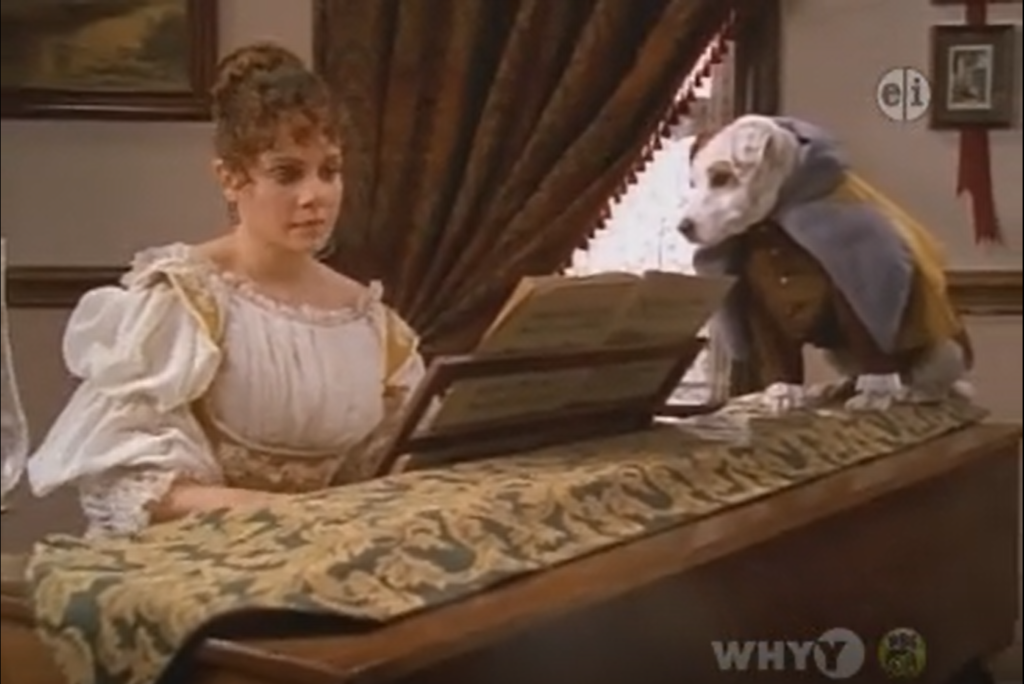
Next Week: Back to Narnia
References
| ↑1 | I’m not going to get into the historical accuracy issue since it requires more research than I feel like doing. |
|---|---|
| ↑2 | Though I still honestly prefer Emma. |
| ↑3 | To be fair, the 1995 miniseries also had Elizabeth lose her temper more than she does in the book in the scene of Mr. Collins’s clumsy attempt to comfort the Bennets in their distress, even lashing out at Jane though she apologized afterwards. This didn’t bother me. I don’t think Elizabeth should never be visibly upset, just not as often as in the 2005 movie. |
| ↑4 | The movie does retain her being ridiculously happy about her youngest daughter’s eventual marriage instead of seeing it as a sadly necessary evil as everyone else does but her final scene in the movie makes her much more self-aware and dignified than the equivalent moment in the book. |
| ↑5 | She’s also far too pretty to be the plain sister even though that still seems like how she’s supposed to appear. Or am I just the only one who finds straight hair attractive? |
| ↑6 | The modern Pride and Prejudice update, The Lizzie Bennet Diaries, also would have Lydia and Mary be more sympathetic than in the book but it would do so more deliberately and alter their relationships with the other characters to match. |
| ↑7 | Speaking of unappealing, I’m not a fan of this adaptation’s decision to portray Mr. Bingley (Simon Woods) as such a comic bungler. It makes it hard to root for him to end up with the sweet, dignified Jane. Her relentlessly thinking the best of everyone could potentially be played for laughs too, making them a better match, but it isn’t here. |
| ↑8 | And for what it’s worth, I don’t think it’s against the spirit of the book to portray Elizabeth as loving the beauties of nature. Austen had her be excited to tour the countryside with her aunt and uncle and be impressed by Darcy’s magnificent grounds. |
| ↑9 | Speaking of those drafts, neither of them contains my favorite line in the movie that’s not from the book. When an embarrassed Elizabeth limply says she doesn’t want to see Mr. Darcy’s house because “he’s so…rich,” Mr. Gardiner says, “Good heavens, Lizzie, what a snob you are! Objecting to poor Mr. Darcy because of his wealth! The Poor man can’t help it.” I’m willing to bet that was written by Emma Thompson, who reportedly did uncredited touchups on the script, rather than Deborah Moggach. |
| ↑10 | In the movie’s defense, the part of the story that takes place at Pemberley is a pain for adapters since it’s where Darcy and Elizabeth really bond with each other, but Austen didn’t write any dialogue between them during it. Why did she do that to us? |
| ↑11 | Besides which they forgot that Much Ado About Nothing was the real original romcom! |
